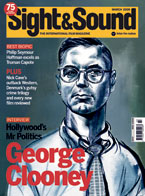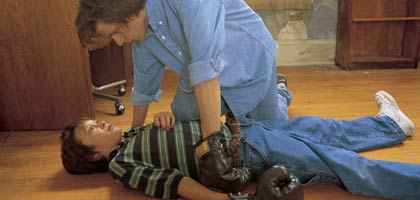
Scene from a marriage
Film of the Month: The Squid and the Whale

The fate of adolescent children snared in their parents' break-up may not be a new theme, but Noah Baumbach treats it with humour, empathy and a note-perfect soundtrack. By Edward Lawrenson
A family game of tennis opens The Squid and the Whale: Dad and elder son pitted against Mum and the younger boy. The set-up primes you for scenes of domestic contentment, yet from the first minutes of writer-director Noah Baumbach's new film you sense that something is awry. The father lunges aggressively at every shot, sweat blotching his tracksuit with each exertion. A return-of-service nearly hits the mother, who shoots her husband a look of sharp rebuke; and when, moments later, a ball he strikes lands on her chest she picks up her gear and storms off. The kids are left on the court, watching as their parents squabble, their angry clamour amplified by the vault of the indoor arena. This is marital relations reduced to bitter point-scoring, where the children are spectators to a contest whose rules they don't understand.
It's a suitably discordant introduction to the Berkmans, the middle-class Brooklyn family who are at the centre of The Squid and the Whale. Ten minutes or so further in - after Dad has taken to sleeping on the sofa-bed and midnight rows with his wife are dimly heard by the kids upstairs - Bernard (Jeff Daniels) and Joan Berkman (Laura Linney) have seated their two sons down for a family conference amid the artful chaos of their brownstone living room. There Bernard and Joan nervously announce their separation. At this 12-year-old Frank (Owen Kline), a slight, button-nosed kid who hasn't yet outgrown his babyish nickname of Pickle, starts crying as his parents discuss the new living arrangements. His 16-year-old brother Walt (Jesse Eisenberg), a gangly, serious-looking teenager with a voice that trembles between adolescent intensity and insecurity, asks where the cat will now stay.
This typically well-played scene sets the tone for the rest of the film. Delicately flitting between the teary, unguarded vulnerability Frank displays here and his brother's more detached, practical attitude, this is a poignant, often funny portrait of the boys' reaction to their parents' break-up. Set in 1986, it follows Frank and Walt as they divide their weeks between their former family home (where their mother remains) in the prosperous Park Slope area of Brooklyn and their father's run-down place a few miles away in a less salubrious neighbourhood.
Baumbach's own parents - Brooklyn-based writers, like Bernard and Joan - divorced when he was a teenager in the late 1980s, and while he has denied that the film is directly autobiographical, it does display a remarkable empathy with Walt and Frank. The result is refreshingly matter-of-fact about the practicalities of family break-up, in contrast to the (implicitly conservative) Hollywood tendency to 'blame' one of the partners (cf Kramer vs Kramer, 1979).
There's an instructive scene, for instance, where Walt is given advice about joint custody by his worldweary classmates: it sucks, is the resigned consensus. And there's a wonderfully jazzy montage - shot with sketchy, handheld camerawork that shows Baumbach's acknowledged debt to 1960s direct cinema - of the subway stops the brothers must pass between their old home and their father's new one.
The film is astute about the mounting emotional demands placed on the boys as they bounce from one house to the other in a weekly ritual that resembles a grand-scale version of the opening tennis match. Despite Bernard and Joan's efforts to maintain an amicable front, allegiances and antagonisms develop and are exploited. Walt, played with nervy self-involvement tempered by occasional flashes of wit by Eisenberg, idolises his father even before the break-up, which he subsequently blames on Joan; Frank, meanwhile, chafes at Bernard's parenting skills - which include serving him a steak cutlet flipped off the kitchen floor and engaging in aggressively competitive ping-pong matches - and spends increasing time with Joan (a figure of warmth and sharp intelligence, beautifully played by Linney) and her laidback tennis-coach boyfriend Ivan (William Baldwin).Produced by Wes Anderson (with whom Baumbach co-wrote The Life Aquatic), this tale of unruly family relations in a classy New York neighbourhood may bring to mind The Royal Tenenbaums - a comparison further encouraged by the whimsical soundtrack.
But whereas Anderson's movie was playful and theatrical - with a vision of New York, Baumbach has remarked, filtered through the Houston-born Anderson's love of movies and literature about the city - this film is looser and more naturalistic. Baumbach's eye for detail is evident in the contrast between the lived-in, bourgeois comfort of Joan's home - all stripped wood and book-lined walls - and Bernard's sparsely furnished place, where even the posters pinned up to hide the cracks in the plaster look wrong.
The evocation of the period is note-perfect, with a choice of original music likely to trigger jolts of recognition in viewers who were around Walt's age in the late 1980s. Highlights include the Cars' dollop of synth-heavy syrup 'Drive', which plays as Walt and his girlfriend Sophie heavy-pet in her parents' bedroom. There's a mischievous extract from the soundtrack to that gleefully salacious 1983 Tom Cruise teen movie Risky Business as Frank acts out his adolescent fantasies alone in his mother's room. And could there be a better cue to Walt's cloudy sense of introspection than Pink Floyd's superbly maudlin 'Hey You', which he listens to alone on headphones, the big cups shutting him off from the outside world?
The song acquires a more direct narrative significance when Walt performs it at his school's talent show, claiming it as his own composition. It's the clearest example of the way culture is deployed by Walt to impress.
"Have you read Kafka?" is his chat-up line to Sophie, although it soon becomes clear he hasn't:
"It's very Kafka-esque" is the best he can manage when Sophie tells him of her admiration for The Metamorphosis. But it's his father, a pompous, vainglorious, self-obsessed author well past his best work, who is most guilty of such intellectual grandstanding - and from whom the adoring Walt takes his cue. A cultural snob and shameless namedropper - an anecdote about attending a party thrown by George Plimpton works its way into some fatherly, and hugely unsound, advice about dating - Bernard dispenses his judgements on art and literature in a growling monotone, the voice of a man who has failed to be interesting to anyone but himself. It's a superb performance by Jeff Daniels: bearded, dressed down in dishevelled tweeds and T-shirts, he plays the comic potential of Bernard's pedantry to the hilt. In one very funny scene over ping-pong with a surly Frank he tries to curb what he fears are his son's "philistine" ways by reminding him of the subtitled film he went to see - L'Enfant sauvage, appropriately enough, given Frank's wild tendencies towards the end of the movie. But while there's a richly comic dimension to Daniels' portrayal, he never lets Bernard become a caricature. He might dispense cultural soundbites to his kids like mouthfuls of castor oil (A Tale of Two Cities is "minor Dickens", Bernard imperiously informs Walt over dinner, poisoning the kid's view of the book he has to write a class report on before he's even read it), but there's a pitiful edge of desperation to the way he uses the tactic to try to make a claim on their upbringing. Of course Joan later alleges that he's taking such an involved role because
he can't afford child-custody costs, and it's a testament to the nuanced performances of Daniels and Linney - and to the film's persuasive portrait of the rancorous atmosphere of their break-up - that we don't know whom to believe. We see Bernard and Joan on better terms during a sequence on the steps of the house that is now hers but which they once shared. As the camera hovers around the doorway - as if expressing the hesitancy both former partners feel about the changed boundaries of their domestic space - their conversation reveals that a melancholy affection still lingers. It's a glimpse into happier times which gives a genuine sense of hurt to Bernard's more outrageous, embittered behaviour (the worst of which is - in a moment of comic shamelessness - that he casually drops mention to Walt of Joan's affairs through their marriage). The scene on the steps is one of only a few unwitnessed by either Walt or Frank, and it's perhaps significant that they aren't granted this view of the tender side of their parents' relationship. Instead, the ugly, upsetting business of the marriage unravelling is all they see - and this wry, touching and wise film looks on with them. As the kids adjust to and finally call the shots in the new domestic arrangements, the experience imparts some hard lessons about family life. In the funniest gag, Bernard takes Walt and Sophie to see Blue Velvet, as uncompromising a movie about the twisted dynamics of family relations as Hollywood has ever made. And yet for all its admirably unsentimental view of domestic disharmony, The Squid and the Whale is still generous enough to leave Walt and Frank uncorrupted. Blue Velvet, after all, wasn't Walt's choice: he wanted to see Short Circuit, a goofy Steve Guttenberg comedy about a talking robot.
